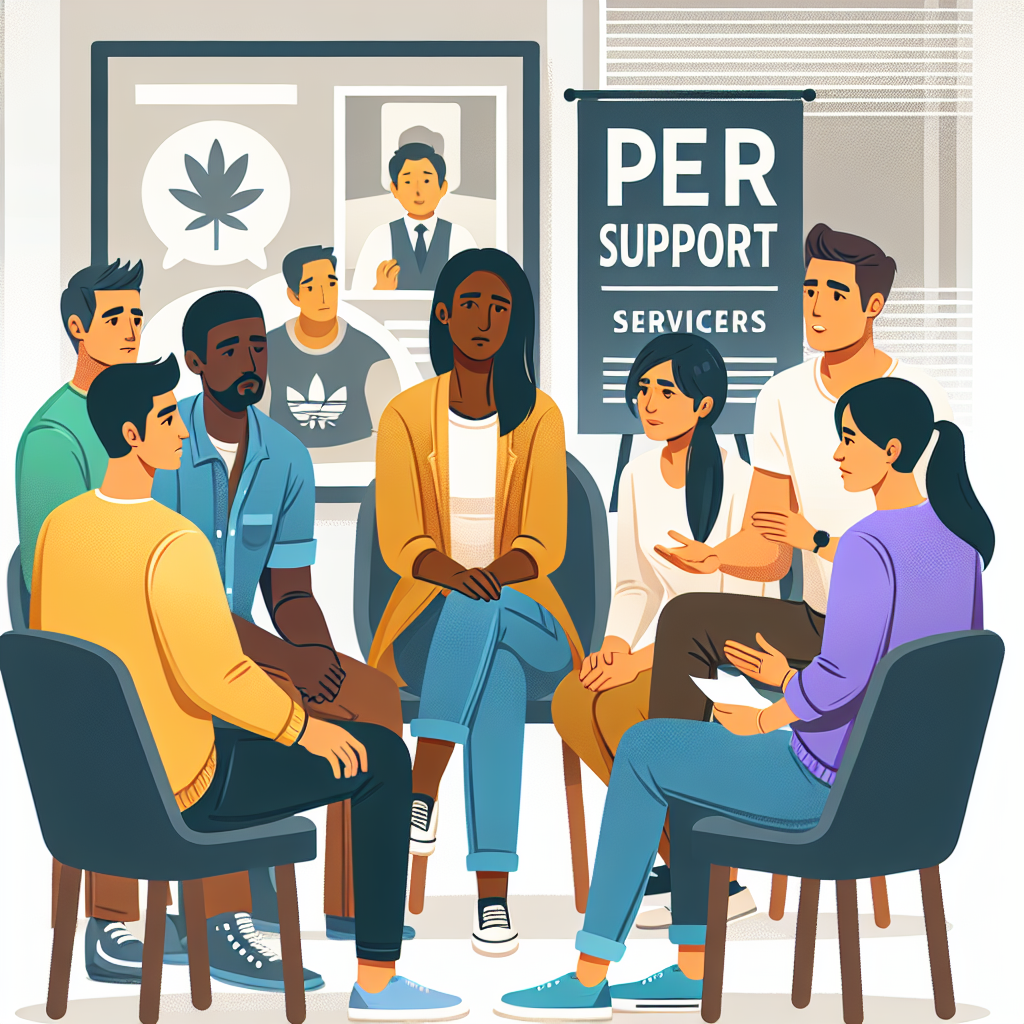-
Table of Contents

“Empowering Recovery Together: Harnessing Peer Support for Lasting Change.”
Introduction
Addiction recovery services often incorporate peer support as a fundamental component of the recovery process. Peer support involves individuals who have experienced addiction themselves and have successfully navigated the path to recovery. These peers provide emotional, social, and practical support to those currently struggling with addiction. By sharing their personal experiences and offering guidance, peer supporters help to foster a sense of community and understanding, which can be crucial for individuals in recovery. This approach not only helps to reduce the stigma associated with addiction but also empowers individuals by showing them that recovery is possible. Peer support can take various forms, including one-on-one mentoring, group meetings, and participation in recovery-oriented activities, all aimed at promoting long-term sobriety and well-being.
The Role Of Peer Support In Addiction Recovery Services
Addiction recovery is a multifaceted journey that often requires a combination of medical treatment, counseling, and community support. One of the most impactful elements in this process is peer support, which has become an integral part of addiction recovery services. Peer support involves individuals who have experienced addiction themselves and have successfully navigated the path to recovery. These individuals offer guidance, empathy, and encouragement to those who are currently struggling with addiction, creating a unique and powerful dynamic that can significantly enhance the recovery process.
The role of peer support in addiction recovery services is multifaceted. Firstly, it provides a sense of belonging and understanding that is often missing in traditional therapeutic settings. When individuals in recovery interact with peers who have faced similar challenges, they feel less isolated and more understood. This shared experience fosters a sense of community and solidarity, which can be incredibly motivating for someone who is trying to overcome addiction. The knowledge that someone else has walked the same path and emerged victorious can instill hope and determination in those who are still in the throes of their struggle.
Moreover, peer support can bridge the gap between clinical treatment and real-world application. While medical professionals and therapists offer invaluable expertise, they may not always fully grasp the day-to-day challenges of living with addiction. Peer supporters, on the other hand, can provide practical advice and coping strategies that are grounded in lived experience. This practical guidance can be particularly beneficial in helping individuals navigate triggers, manage cravings, and develop healthy routines. By sharing their own stories and solutions, peer supporters can offer a roadmap that is both relatable and actionable.
In addition to providing emotional and practical support, peer supporters also serve as role models. Their presence is a testament to the possibility of recovery, demonstrating that it is achievable with perseverance and the right support. This can be incredibly inspiring for individuals who may feel overwhelmed by the prospect of recovery. Seeing someone who has successfully overcome addiction can shift their mindset from one of despair to one of possibility, encouraging them to stay committed to their recovery journey.
Furthermore, peer support can enhance the effectiveness of other treatment modalities. For instance, individuals who participate in peer support groups often report higher levels of engagement and satisfaction with their overall treatment plan. The sense of accountability and mutual encouragement found in peer support settings can complement individual therapy, medication-assisted treatment, and other interventions. This holistic approach can lead to more sustained and meaningful recovery outcomes.
Another significant aspect of peer support is its ability to empower individuals in recovery. By taking on the role of a peer supporter, individuals who have achieved stability in their own recovery can give back to the community. This not only reinforces their own commitment to sobriety but also provides them with a sense of purpose and fulfillment. The act of helping others can be profoundly healing and can further solidify their own recovery journey.
In conclusion, peer support plays a crucial role in addiction recovery services by offering emotional, practical, and inspirational benefits. It creates a sense of community, bridges the gap between clinical treatment and real-world application, serves as a source of inspiration, enhances the effectiveness of other treatments, and empowers individuals in recovery. By integrating peer support into addiction recovery services, we can create a more comprehensive and compassionate approach to overcoming addiction, ultimately leading to more successful and lasting recovery outcomes.
Benefits Of Peer Support In Addiction Recovery Programs
Addiction recovery is a challenging journey that requires a multifaceted approach to ensure success. One of the most impactful elements in this process is peer support, which has been increasingly integrated into addiction recovery services. Peer support involves individuals who have experienced addiction themselves and are now in recovery, offering guidance, empathy, and encouragement to those currently struggling. This approach not only provides practical assistance but also fosters a sense of community and belonging, which is crucial for long-term recovery.
To begin with, peer support offers a unique form of empathy that is difficult to replicate through other means. Those who have walked the path of addiction and recovery can offer insights and understanding that professionals without this lived experience may not fully grasp. This shared experience creates a bond of trust and relatability, making it easier for individuals in recovery to open up about their struggles and fears. Consequently, this level of understanding can significantly reduce feelings of isolation and shame, which are common barriers to seeking help.
Moreover, peer support can serve as a powerful source of inspiration and motivation. Seeing someone who has successfully navigated the challenges of addiction can instill hope and the belief that recovery is possible. This is particularly important during moments of doubt or relapse, as it provides a tangible example of success. The stories of peers who have overcome similar obstacles can be incredibly motivating, encouraging individuals to stay committed to their recovery journey.
In addition to emotional support, peers can offer practical advice and strategies that have worked for them. This can include coping mechanisms, tips for managing triggers, and recommendations for resources such as support groups or therapy options. This practical guidance is invaluable, as it comes from a place of experience and has been tested in real-life scenarios. Furthermore, peers can help navigate the often complex landscape of addiction recovery services, providing insights into what to expect and how to make the most of available resources.
Another significant benefit of peer support is the creation of a supportive community. Addiction often leads to social isolation, and rebuilding a network of supportive relationships is a critical component of recovery. Peer support groups provide a safe space where individuals can connect with others who understand their experiences. This sense of community can be incredibly empowering, as it reinforces the idea that individuals are not alone in their struggles. The relationships formed in these groups can offer long-term support, extending beyond formal recovery programs and into everyday life.
Furthermore, peer support can also contribute to the personal growth and development of the peers themselves. By helping others, peers reinforce their own commitment to recovery and gain a sense of purpose and fulfillment. This reciprocal relationship benefits both parties, creating a cycle of support and encouragement that strengthens the recovery community as a whole.
In conclusion, the integration of peer support into addiction recovery services offers numerous benefits that can significantly enhance the recovery process. From providing empathetic understanding and practical advice to fostering a sense of community and mutual growth, peer support plays a vital role in helping individuals overcome addiction. By leveraging the power of shared experiences and mutual support, addiction recovery programs can create a more effective and compassionate approach to healing, ultimately leading to more successful and sustainable recovery outcomes.
Q&A
1. How do addiction recovery services involve peer support?
Addiction recovery services often involve peer support by incorporating peer-led support groups where individuals in recovery can share experiences, offer mutual encouragement, and provide accountability to one another.
2. How do peer support specialists contribute to addiction recovery services?
Peer support specialists, who are individuals with lived experience of addiction and recovery, contribute by offering guidance, emotional support, and practical advice to those currently undergoing treatment, helping to foster a sense of community and understanding.
Conclusion
Addiction recovery services often involve peer support by incorporating individuals who have experienced addiction themselves and have successfully navigated the recovery process. These peers provide emotional support, share personal experiences, and offer practical advice, fostering a sense of community and understanding. Peer support can enhance motivation, reduce feelings of isolation, and improve overall outcomes by creating a supportive network that encourages sustained recovery and personal growth.



